Picking up six years after the first installment, 1980 finds us looking at the police officers in charge of finding the Yorkshire Ripper, and discovering only lip service being paid to the public. Why bother finding a serial killer when it may tie into a corrupted activity that you or your best friends are actively participating in. That wouldn’t just look bad for the police force, but the elected officials that they lie in bed with (metaphorically). Due to a very public backlash, they have called in an outsider to investigate accusations of corrupt and general incompetence. Do I really need to explain that this only ends in sheer devastation and grief for this poor soul thrust into the middle of this destructive force? You’ve seen the first film; there are no happy endings here.
Like the previous film, 1980 rests a bulk of the film on one central performance, so the pass/fail nature of the film is just as high. Luckily Paddy Considine is more than up to the challenge. Knowing him primarily from Hot Fuzz, I was pretty astounded by his depth of feeling and commitment to the seriousness and melancholia of the work. From the first moment that he is on the screen he is perfectly in character and radiating out a desperate isolation from life.
And like Considine’s minimalist performance, director James Marsh places his camera and utilizes the 35mm film to play his chess game close to the bone. 1980 doesn’t have the stylistic exercises that distracted from 1974’s taunt premise or the random bits of ultra-violence. Instead, it tightly wraps us corridors and close-ups, making us a complicit part of this game by removing any distance and making us stare out with Considine as he quietly tries to make sense and piece the mysteries all together. Would it by hyperbolic to say that the second film in a trilogy is always the best? Well, 1980 is certainly not the exception to that rule. It’s the best of the three, hands down.
Red Riding: 1980
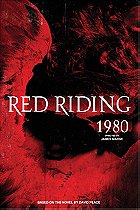 Posted : 11 years, 9 months ago on 10 September 2013 07:06
(A review of Red Riding: 1980)
Posted : 11 years, 9 months ago on 10 September 2013 07:06
(A review of Red Riding: 1980) 0 comments, Reply to this entry
0 comments, Reply to this entry
Red Riding: 1974
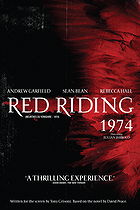 Posted : 11 years, 9 months ago on 10 September 2013 07:06
(A review of Red Riding: 1974)
Posted : 11 years, 9 months ago on 10 September 2013 07:06
(A review of Red Riding: 1974)“This is the north, where we do what we want.”
Ramble rousing cry? Or braggart threat? As the Red Riding Trilogy unfolds it becomes both of these things, sometimes at once. And sometimes it’s spoken like a mantra without much thought put behind the words or any deeper meanings these words may contain. But that is getting ahead of myself, as each individual film adds up to a bleak portrait of a place more so than a coherent dissertation on the Red Riding killer or any singular unsolved mystery.
The story begins in 1974 and follows a young reporter (Andrew Garfield) who uncovers a series of disparate missing and presumed dead girls are actually related. But the dangers and mysteries extended further out and go deeper into the society that has allowed them to happen than he could possibly imagine. These earliest murders occupy a weird space – part of an underground network of powerful men indulging in depraved acts, partly the byproduct of a city’s uncertain movements toward modernity – and their shaky, violent vibrations will be felt throughout the rest of the films.
1974 (and the rest of the trilogy) has problems with decipherability of language (those Yorkshire accents are sometimes unintelligible) and clarity of narrative. But it doesn’t matter, each film is plotted by the same writer and given to a different director is high on style, incredibly well acted and always engaging even in moments when it becomes incredibly hard to remember or even figure out what is going on. Garfield is one of the best younger working actors currently and his performance here is a testament to that fact. Sean Bean and Rebecca Hall are solid in their major supporting roles. Bean is particularly effective exposing tiny bits of rot and grim beneath his character’s well-to-do exterior, and Hall continues to display her quivering vulnerability and she’s the lone bright light in this pit of eternal darkness.
1974 begins to explore the social malaise that took hold in the seventies, but it’s really just prep work for the deep dive we’re about to experience in the second half. Shot in 16mm, the film has a pleasantly gritty, atmospheric look, but does occasionally dip into overly stylized and embellished theatrics which call too much attention to themselves. But still, as far as establishing stories go, 1974 has more than enough merits to stand on its own. A word of warning, if this film is too dark or densely plotted or not fast moving enough for you, just jump ship now as the trilogy only gets more obtuse and labyrinthine as you go along.
Ramble rousing cry? Or braggart threat? As the Red Riding Trilogy unfolds it becomes both of these things, sometimes at once. And sometimes it’s spoken like a mantra without much thought put behind the words or any deeper meanings these words may contain. But that is getting ahead of myself, as each individual film adds up to a bleak portrait of a place more so than a coherent dissertation on the Red Riding killer or any singular unsolved mystery.
The story begins in 1974 and follows a young reporter (Andrew Garfield) who uncovers a series of disparate missing and presumed dead girls are actually related. But the dangers and mysteries extended further out and go deeper into the society that has allowed them to happen than he could possibly imagine. These earliest murders occupy a weird space – part of an underground network of powerful men indulging in depraved acts, partly the byproduct of a city’s uncertain movements toward modernity – and their shaky, violent vibrations will be felt throughout the rest of the films.
1974 (and the rest of the trilogy) has problems with decipherability of language (those Yorkshire accents are sometimes unintelligible) and clarity of narrative. But it doesn’t matter, each film is plotted by the same writer and given to a different director is high on style, incredibly well acted and always engaging even in moments when it becomes incredibly hard to remember or even figure out what is going on. Garfield is one of the best younger working actors currently and his performance here is a testament to that fact. Sean Bean and Rebecca Hall are solid in their major supporting roles. Bean is particularly effective exposing tiny bits of rot and grim beneath his character’s well-to-do exterior, and Hall continues to display her quivering vulnerability and she’s the lone bright light in this pit of eternal darkness.
1974 begins to explore the social malaise that took hold in the seventies, but it’s really just prep work for the deep dive we’re about to experience in the second half. Shot in 16mm, the film has a pleasantly gritty, atmospheric look, but does occasionally dip into overly stylized and embellished theatrics which call too much attention to themselves. But still, as far as establishing stories go, 1974 has more than enough merits to stand on its own. A word of warning, if this film is too dark or densely plotted or not fast moving enough for you, just jump ship now as the trilogy only gets more obtuse and labyrinthine as you go along.
 0 comments, Reply to this entry
0 comments, Reply to this entry
Broadway Danny Rose
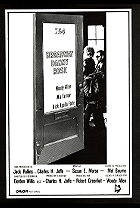 Posted : 11 years, 10 months ago on 28 August 2013 09:55
(A review of Broadway Danny Rose)
Posted : 11 years, 10 months ago on 28 August 2013 09:55
(A review of Broadway Danny Rose)With a list of credits that amounts to roughly one film per year since 1965, there’s bound to be some great work that gets lost among the towering monuments of films like Annie Hall or The Purple Rose of Cairo. While not as top shelf as those two examples, Broadway Danny Rose is still a pretty great film.
It casts its spell over you fairly quickly, as the film is a story told in flashback not by any of the principal characters in it, but by a group of show business veterans who look at our title character with a mixture of warmth, respect and great humor in his exploits. Woody Allen, not an actor of tremendous range, crafts a charming character out of his well-known persona and, more than likely, disparate parts of real-life characters he had met over the years. It’s good that we can find him amusing and enjoyable to spend time with even when he dips into darker territory, the plot does revolve around him escorting his client mistress around town while simultaneously falling for her. And the plot, not always the strongest part of the Allen film package which comes in the characters and dialog, is truly secondary to the three central performances, especially the one from Mia Farrow.
Allen is famous for crafting and creating strong, complicated and dynamic female characters. And Farrow’s gum-chewing gangster’s moll is a nice change of pace from her normally sweet, demure and open characters. That she creates so strong a performance while wearing sunglasses the whole time is a testament to her gifts, and that she so effortlessly nails her laughs and sells her tough-talk is a stronger one. Sure the plot ends in a slapstick manner that isn’t entirely satisfying, but everything up until that point side-steps the easy stereotypes these characters and situation could have become. So, it ends in a less than stellar way, but that doesn’t mean it isn’t underrated. And underrated Woody Allen is a pretty fantastic thing.
It casts its spell over you fairly quickly, as the film is a story told in flashback not by any of the principal characters in it, but by a group of show business veterans who look at our title character with a mixture of warmth, respect and great humor in his exploits. Woody Allen, not an actor of tremendous range, crafts a charming character out of his well-known persona and, more than likely, disparate parts of real-life characters he had met over the years. It’s good that we can find him amusing and enjoyable to spend time with even when he dips into darker territory, the plot does revolve around him escorting his client mistress around town while simultaneously falling for her. And the plot, not always the strongest part of the Allen film package which comes in the characters and dialog, is truly secondary to the three central performances, especially the one from Mia Farrow.
Allen is famous for crafting and creating strong, complicated and dynamic female characters. And Farrow’s gum-chewing gangster’s moll is a nice change of pace from her normally sweet, demure and open characters. That she creates so strong a performance while wearing sunglasses the whole time is a testament to her gifts, and that she so effortlessly nails her laughs and sells her tough-talk is a stronger one. Sure the plot ends in a slapstick manner that isn’t entirely satisfying, but everything up until that point side-steps the easy stereotypes these characters and situation could have become. So, it ends in a less than stellar way, but that doesn’t mean it isn’t underrated. And underrated Woody Allen is a pretty fantastic thing.
 0 comments, Reply to this entry
0 comments, Reply to this entry
Fire and Ice
 Posted : 11 years, 10 months ago on 28 August 2013 09:55
(A review of Fire and Ice)
Posted : 11 years, 10 months ago on 28 August 2013 09:55
(A review of Fire and Ice)Frank Frazetta was a great fantasy illustrator. Probably the best in the business by sheer virtue of his influence which trickeld down into Saturday morning cartoons (Masters of the Universe), video games (The Legend of Zelda franchise), superhero comics (Marc Silvestri is an admitted fan and disciple). So it would seem a prime case that his artwork and influence would lead to an animated fantasy film that would stand tall in the genre and be a measuring stick for the rest of it, in terms of looks alone. Sadly, Fire and Ice is only halfway there in every sense of the phrase.
It seems odd that Ralph Bakshi would want to create a sword and sorcery story when so much of his work resides in the spaces in-between the towering skyscrapers and amongst the urbanite malaise. Truth be told, the same problems with the animation in those films carries over into this one. Backgrounds are beautifully painted but static, characters never actually interact with them in any meaningful way leaving behind the impression that they’re floating on top of the environments and actions. There’s a nice visual landscape going on, and it’s peopled with a few original and interesting character designs, but the monosyllabic heroes are ripped straight from Conan the Barbarian, perhaps blunted of their more dangerous edges. There still remains a problem of overly sexualized male-fantasy females who wear outfits that make pasties and a g-string look like a nun’s robes. If they were actually self-empowered and not damsels-in-distress so much of the time the skimpy outfits wouldn’t bother me as much, but the main character feels like wish-fulfillment masturbatory fantasy for a thirteen year old.
The story had been done a million times before this and it offers up nothing new, which is a shame given the immense creative talents going on behind the scenes. Having said that, it’s entertaining enough and moves with a nice quick pace. Occasionally stumbling across an arresting scene or moment by happy accident, and the rotoscoping here doesn’t announce itself so jarringly as it did in his version of Lord of the Rings. I know I haven’t exactly been kind of Bakshi or his work, so why do I keep watching his films? Well, I want to like and respect him as an artist since he has taken animation into an area that is outside of the easily-digestible Disney happy-place. While I may find his work sometimes vulgar or ugly, often times both, I want to believe that there’s at least something of major value that he made. I’m still looking.
It seems odd that Ralph Bakshi would want to create a sword and sorcery story when so much of his work resides in the spaces in-between the towering skyscrapers and amongst the urbanite malaise. Truth be told, the same problems with the animation in those films carries over into this one. Backgrounds are beautifully painted but static, characters never actually interact with them in any meaningful way leaving behind the impression that they’re floating on top of the environments and actions. There’s a nice visual landscape going on, and it’s peopled with a few original and interesting character designs, but the monosyllabic heroes are ripped straight from Conan the Barbarian, perhaps blunted of their more dangerous edges. There still remains a problem of overly sexualized male-fantasy females who wear outfits that make pasties and a g-string look like a nun’s robes. If they were actually self-empowered and not damsels-in-distress so much of the time the skimpy outfits wouldn’t bother me as much, but the main character feels like wish-fulfillment masturbatory fantasy for a thirteen year old.
The story had been done a million times before this and it offers up nothing new, which is a shame given the immense creative talents going on behind the scenes. Having said that, it’s entertaining enough and moves with a nice quick pace. Occasionally stumbling across an arresting scene or moment by happy accident, and the rotoscoping here doesn’t announce itself so jarringly as it did in his version of Lord of the Rings. I know I haven’t exactly been kind of Bakshi or his work, so why do I keep watching his films? Well, I want to like and respect him as an artist since he has taken animation into an area that is outside of the easily-digestible Disney happy-place. While I may find his work sometimes vulgar or ugly, often times both, I want to believe that there’s at least something of major value that he made. I’m still looking.
 0 comments, Reply to this entry
0 comments, Reply to this entry
Ghost Dog: The Way of the Samurai
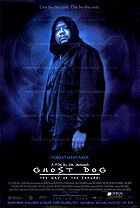 Posted : 11 years, 10 months ago on 28 August 2013 09:55
(A review of Ghost Dog: The Way of the Samurai)
Posted : 11 years, 10 months ago on 28 August 2013 09:55
(A review of Ghost Dog: The Way of the Samurai)Well, this is a deeply strange film as only Jim Jarmusch could do I suppose. In the end it turns out to be a more interesting experiment than a successful film. But Forest Whitaker is fantastic in the central performance. Alternately commanding, intimidating and soothing, melancholic, his Ghost Dog is as contradictory as the film that surrounds him. Born into the ghetto of an undisclosed city while expressing an obsession with Japanese culture and working as a samurai/killer-for-hire for the Italian mafia, there’s a cross-cultural influence going on here for certain yet I’m not sure it ends up making a lot of sense. It’s a fascinating idea though.
Ghost Dog: The Way of the Samurai would seem primed and ready to begin a discussion on post-modern identity and inner-city life, but instead choses to explore violence and almost offering up a compare-and-constrat view of Mafioso lifestyles and samurai’s honor code. It’s a neat idea, but then he starts adding on a bunch of strange details that detract from the central conceit for me. Characters reading Rashomon like it was as normal as breathing is strange, and perhaps too heavy-handed in pushing forward the point that Ghost Dog is bound to someone through two very different memories of what happened. And his lone friendship with an ice cream truck driver who only speaks French feels entirely superfluous, as if it had been added solely to remind us of the parallels between this film and Le Samourai.
Bringing up these parallels to better films only serves to remind us how frustrating and obtuse Ghost Dog is. It doesn’t always seem to be moving towards anything of real value or note for extended periods of time, and the big twist at the end was something that felt clearly marked for anyone paying even the slightest bit of attention. I’m still glad to have watched it, as frustrating an experience as it could become. A bit too heavy with the symbolism and allusions to other work, but still well-made and solid as its own entity with a deeply strange and conflicting sense of self. It only helps that the film has Whitaker to anchor it. He’s an underrated talent who I think could possibly make even the more opaque of characters sympathetic and watchable.
Ghost Dog: The Way of the Samurai would seem primed and ready to begin a discussion on post-modern identity and inner-city life, but instead choses to explore violence and almost offering up a compare-and-constrat view of Mafioso lifestyles and samurai’s honor code. It’s a neat idea, but then he starts adding on a bunch of strange details that detract from the central conceit for me. Characters reading Rashomon like it was as normal as breathing is strange, and perhaps too heavy-handed in pushing forward the point that Ghost Dog is bound to someone through two very different memories of what happened. And his lone friendship with an ice cream truck driver who only speaks French feels entirely superfluous, as if it had been added solely to remind us of the parallels between this film and Le Samourai.
Bringing up these parallels to better films only serves to remind us how frustrating and obtuse Ghost Dog is. It doesn’t always seem to be moving towards anything of real value or note for extended periods of time, and the big twist at the end was something that felt clearly marked for anyone paying even the slightest bit of attention. I’m still glad to have watched it, as frustrating an experience as it could become. A bit too heavy with the symbolism and allusions to other work, but still well-made and solid as its own entity with a deeply strange and conflicting sense of self. It only helps that the film has Whitaker to anchor it. He’s an underrated talent who I think could possibly make even the more opaque of characters sympathetic and watchable.
 0 comments, Reply to this entry
0 comments, Reply to this entry
Swimming with Sharks
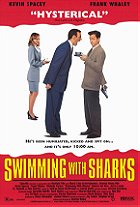 Posted : 11 years, 10 months ago on 28 August 2013 09:55
(A review of Swimming with Sharks)
Posted : 11 years, 10 months ago on 28 August 2013 09:55
(A review of Swimming with Sharks)Well, here is a case of a film not knowing which one it wants to be. Uneven is a charitable phrase for this thing. Swimming with Sharks would have rated much lower if it didn’t have Kevin Spacey dazzling us in the lead role. When in doubt, just sit back and let Spacey occupy the screen as morally compromised or flat-out abusive and terrible characters he has made his stock and trade. Think about the films you remember him the most in: Se7en, L.A. Confidential, The Usual Suspects, American Beauty, even more recently in Horrible Bosses. Spacey is just great at playing terrible people.
And Swimming with Sharks gives us quite a terrible person to spend time with in Spacey’s studio executive. He delights in torturing his assistants and barking orders into a packed hallway. If someone flinches and ducks out of his sight while he walks down a corridor, all the better, because he is addicted to the power and fear that his presence can bring. And the movie is quite enjoyable when we focus in on the relationship between Spacey and his latest helper, played by Frank Whaley. The movie takes a dark and ugly turn when Whaley’s character decides to enact his revenge by breaking into his boss’s house, tying him up and torturing him – literally this time, not figuratively. This turn stands in ugly contrast to more biting satirical edge the rest of the film has, a dour intrusion of ugly reality into something that cannot sustain it. And the less we discuss an ending so improbable that it almost insults your intelligence, the better. So there’s two films operating here and bounce back and forth between them. The only thing holding the entire film from collapsing in on itself is the caustic, vitriolic, blistering performance by Spacey.
And Swimming with Sharks gives us quite a terrible person to spend time with in Spacey’s studio executive. He delights in torturing his assistants and barking orders into a packed hallway. If someone flinches and ducks out of his sight while he walks down a corridor, all the better, because he is addicted to the power and fear that his presence can bring. And the movie is quite enjoyable when we focus in on the relationship between Spacey and his latest helper, played by Frank Whaley. The movie takes a dark and ugly turn when Whaley’s character decides to enact his revenge by breaking into his boss’s house, tying him up and torturing him – literally this time, not figuratively. This turn stands in ugly contrast to more biting satirical edge the rest of the film has, a dour intrusion of ugly reality into something that cannot sustain it. And the less we discuss an ending so improbable that it almost insults your intelligence, the better. So there’s two films operating here and bounce back and forth between them. The only thing holding the entire film from collapsing in on itself is the caustic, vitriolic, blistering performance by Spacey.
 0 comments, Reply to this entry
0 comments, Reply to this entry
Housesitter
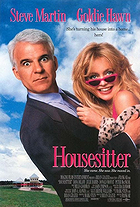 Posted : 11 years, 10 months ago on 28 August 2013 09:55
(A review of Housesitter)
Posted : 11 years, 10 months ago on 28 August 2013 09:55
(A review of Housesitter)Steve Martin and Goldie Hawn can make just about anything watchable. Case in point, Housesitter, not a terrible movie, but not one that will get a lot of play in clips highlighting the best of their careers either. It makes for decent viewing on a lazy Sunday afternoon when you can’t decide what else to watch on Netflix and you want something that requires little to no effort to half-watching.
If that sounds like faint praise, well, it is. Martin and Hawn have an appealing chemistry together and can make individual moments sing beautifully. It’s a pity a better vehicle for the duo was never found. Ah well, at least they can zip back and forth with each other with great ease and dexterity, rolling with the verbal punches and throwing themselves into the physical comedy bits. It’s the script that lets them down.
A screwball comedy that isn’t very screwball zany or madcap, Housesitter sees two characters engage in a tenuous truce to try and get what the other one wants, building lie upon lie for self-preservation and as personal attacks until the truth becomes muddled and their true love shines through in the end. The supporting characters are tasked with acting and playing dumb to a degree that is uncharitable for the actors involved, and much of it lands with a more amused shrug than a comedic outburst. Blame Frank Oz’s sluggish direction. Blame the script from Brian Grazer and Mark Stein which starts off well enough but ends in a rushed and unsatisfactory manner, throwing in one last curveball before the fade out. But mostly, don’t expect much from it and you’ll have a mildly amusing time.
If that sounds like faint praise, well, it is. Martin and Hawn have an appealing chemistry together and can make individual moments sing beautifully. It’s a pity a better vehicle for the duo was never found. Ah well, at least they can zip back and forth with each other with great ease and dexterity, rolling with the verbal punches and throwing themselves into the physical comedy bits. It’s the script that lets them down.
A screwball comedy that isn’t very screwball zany or madcap, Housesitter sees two characters engage in a tenuous truce to try and get what the other one wants, building lie upon lie for self-preservation and as personal attacks until the truth becomes muddled and their true love shines through in the end. The supporting characters are tasked with acting and playing dumb to a degree that is uncharitable for the actors involved, and much of it lands with a more amused shrug than a comedic outburst. Blame Frank Oz’s sluggish direction. Blame the script from Brian Grazer and Mark Stein which starts off well enough but ends in a rushed and unsatisfactory manner, throwing in one last curveball before the fade out. But mostly, don’t expect much from it and you’ll have a mildly amusing time.
 0 comments, Reply to this entry
0 comments, Reply to this entry
Union Station
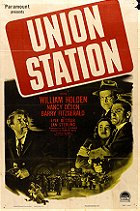 Posted : 11 years, 10 months ago on 16 August 2013 07:26
(A review of Union Station)
Posted : 11 years, 10 months ago on 16 August 2013 07:26
(A review of Union Station)Given that William Holden and Nancy Olson had also starred in Sunset Blvd in 1950, Union Station can’t help but be diminished in comparison. This is a shame, while Union Station never truly reaches the cinematic heights of Billy Wilder’s satirical noir about the ins and outs of showbiz, it does just enough to tweak the formula to make for a highly enjoyable film noir.
When viewed as a whole, Union Station tells a generic story about cops trying to outsmart kidnappers before it’s too late. But it presents a group of cops who are unafraid to fight just as dirty as the kidnappers, if not dirtier. To hear Barry Fitzgerald wrap his normally soothing and kindly voice around stone-cold lines enabling the possible killing of a suspect if he won’t talk is jarring. It creates a sense that we’re dealing with a truly dark world here, and we haven’t even begun to discuss that the victim is a blind teenage girl. That particular bit of the plot feels needlessly manipulative by using someone with a disability to appear extra helpless.
Where Union Station seems to stumble around is whenever it leaves the station and the accusations that the railway doesn’t want to be held liable so much their actions are only for show towards the romance between Olson and Holden. A meet-cute with the family is more distracting than anything. Sure, a minor break in the tension is nice, but seeing the blind girl’s best friend, and main champion for finding her and bringing the kidnappers to justice, devolve into girlish giggling and flirting is distasteful. This pandering to general audiences and final scenes sentimental dialog is supposed to give us a sense of emotional uplift. The grave circumstances and tense climax suddenly feel less enjoyable because of this mismanaging of tones.
When viewed as a whole, Union Station tells a generic story about cops trying to outsmart kidnappers before it’s too late. But it presents a group of cops who are unafraid to fight just as dirty as the kidnappers, if not dirtier. To hear Barry Fitzgerald wrap his normally soothing and kindly voice around stone-cold lines enabling the possible killing of a suspect if he won’t talk is jarring. It creates a sense that we’re dealing with a truly dark world here, and we haven’t even begun to discuss that the victim is a blind teenage girl. That particular bit of the plot feels needlessly manipulative by using someone with a disability to appear extra helpless.
Where Union Station seems to stumble around is whenever it leaves the station and the accusations that the railway doesn’t want to be held liable so much their actions are only for show towards the romance between Olson and Holden. A meet-cute with the family is more distracting than anything. Sure, a minor break in the tension is nice, but seeing the blind girl’s best friend, and main champion for finding her and bringing the kidnappers to justice, devolve into girlish giggling and flirting is distasteful. This pandering to general audiences and final scenes sentimental dialog is supposed to give us a sense of emotional uplift. The grave circumstances and tense climax suddenly feel less enjoyable because of this mismanaging of tones.
 0 comments, Reply to this entry
0 comments, Reply to this entry
Love Happy
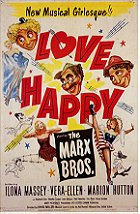 Posted : 11 years, 10 months ago on 16 August 2013 07:26
(A review of Love Happy (1949))
Posted : 11 years, 10 months ago on 16 August 2013 07:26
(A review of Love Happy (1949))No Marx Brothers film is truly complete unless all three (or four, depending on the studio) are allowed to unleash their zany, madcap lunacy upon an orderly and unsuspecting world. So Love Happy clearly earns its place as the Marx Bros. movie with an asterisk next to its name. Groucho narrates and remains off-screen until the very end, Chico is a minor supporting player with relatively little interaction between the other two brothers and Harpo is the star. So, the three brothers all appear, but they rarely appear together.
Harpo has long been the most anarchic and chaos inducing brother, while Chico hurled out one malapropism after another and acted lecherous around female characters (no worse than Groucho or Harpo really) and Groucho would hysterically zing and insult everyone and everything within earshot. Harpo would silently leave behind him a series of destructive elements or use props to create sight-gags, but he needed the others to create the perfect balance. That perfect balance was easily achieved in Horse Feathers, Monkey Business and Duck Soup, but not here as his presence tilts the film too heavily towards relying on secondary characters to propel the plot and provide the dialog. That would be Irving Thalberg's influence on their storytelling coming into full-bloom to overtake the brothers once and for all.
And by and large they are an uninteresting bunch. Of course, Harpo is love sick for a girl who treats him as friend and nothing more. Here that girl is Vera-Ellen, pre-MGM and White Christmas so her body is still more athletic and toned. She looks positively lovely and healthy, and it’s no wonder that she’s the central romantic heroine. The story also involves a stolen bag of jewels, gangsters and a Broadway production. These elements actually come together quite well, but aside from Vera-Ellen, none of the characters standout in the mind long after the film has ended.
Well, there is one sequence with a minor character that stands out. Love Happy is notable for being the last Marx Bros. film, and the first film to feature Marilyn Monroe. She appears only in a very brief scene at the very end of the film, but like Groucho said about casting her in the bit part: when she enters the entire room moves. It’s hard to distinguish if this is us watching her through the prism of her legend, or if her impact on screen is truly that seismic. Groucho’s horn-dog reaction to her mere existence hints back at the magic of the RKO films.
Love Happy is never truly terrible, in fact, it’s better than their first film. But it’s a minor work. Some greats go out with an elegiac swansong like Bette Davis and Lillian Gish in The Whales of August. Others go out with on a career high-point like Henry Fonda in On Golden Pond. But far too many go out with a mere whimper, and the Marx Bros. deserved to go out in a cartoonish spectacle. Luckily, Love Happy’s finale rallies the troops and delivers that moment, but the rest of the film is slim but enjoyable, but nowhere near the best representation of their work. There are a few solid laughs, but too much mediocrity surrounding it.
Harpo has long been the most anarchic and chaos inducing brother, while Chico hurled out one malapropism after another and acted lecherous around female characters (no worse than Groucho or Harpo really) and Groucho would hysterically zing and insult everyone and everything within earshot. Harpo would silently leave behind him a series of destructive elements or use props to create sight-gags, but he needed the others to create the perfect balance. That perfect balance was easily achieved in Horse Feathers, Monkey Business and Duck Soup, but not here as his presence tilts the film too heavily towards relying on secondary characters to propel the plot and provide the dialog. That would be Irving Thalberg's influence on their storytelling coming into full-bloom to overtake the brothers once and for all.
And by and large they are an uninteresting bunch. Of course, Harpo is love sick for a girl who treats him as friend and nothing more. Here that girl is Vera-Ellen, pre-MGM and White Christmas so her body is still more athletic and toned. She looks positively lovely and healthy, and it’s no wonder that she’s the central romantic heroine. The story also involves a stolen bag of jewels, gangsters and a Broadway production. These elements actually come together quite well, but aside from Vera-Ellen, none of the characters standout in the mind long after the film has ended.
Well, there is one sequence with a minor character that stands out. Love Happy is notable for being the last Marx Bros. film, and the first film to feature Marilyn Monroe. She appears only in a very brief scene at the very end of the film, but like Groucho said about casting her in the bit part: when she enters the entire room moves. It’s hard to distinguish if this is us watching her through the prism of her legend, or if her impact on screen is truly that seismic. Groucho’s horn-dog reaction to her mere existence hints back at the magic of the RKO films.
Love Happy is never truly terrible, in fact, it’s better than their first film. But it’s a minor work. Some greats go out with an elegiac swansong like Bette Davis and Lillian Gish in The Whales of August. Others go out with on a career high-point like Henry Fonda in On Golden Pond. But far too many go out with a mere whimper, and the Marx Bros. deserved to go out in a cartoonish spectacle. Luckily, Love Happy’s finale rallies the troops and delivers that moment, but the rest of the film is slim but enjoyable, but nowhere near the best representation of their work. There are a few solid laughs, but too much mediocrity surrounding it.
 0 comments, Reply to this entry
0 comments, Reply to this entry
Penny Serenade
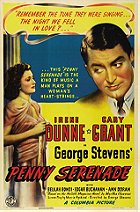 Posted : 11 years, 10 months ago on 16 August 2013 07:26
(A review of Penny Serenade)
Posted : 11 years, 10 months ago on 16 August 2013 07:26
(A review of Penny Serenade)I’ve said it once, and I’m sure I’ll say it a hundred more times: star power can make or break a film. Penny Serenade isn’t a bad film, or even a bad story. In fact, a quiet and absorbing drama could have been made using this story, this director and these actors. But somewhere along the way, Penny Serenade decided it wanted a huge dollop of unnecessary schmaltz added on top, and that is what keeps it from achieving true greatness.
Cary Grant and Irene Dunne need only exist and say their lines for the film to justify its existence, even when it takes overtly manipulative emotional turns. Grant in particular elevates several scenes into heartbreaking tragedy by toning down his romantic leading man charisma and showing us the more damaged human being residing beneath the idealized star. His third-act monolog is a juicy piece of work, detailing emotions and a sense of urgency that we rarely see from him. It’s a performance worthy of an Oscar, and he was nominated but lost to Gary Cooper in Sergeant York.
The plot follows a couple who marries, and has trouble conceiving a child. Attempts at adoption and tensions in their married life factor into the twists and turns in major ways, and a simple kitchen-sink drama could have been effectively made. Instead, they chose to add a wrap-around structure that sees Dunne listening to various records and remembering back to the past events that lead to the trial separation that they’re currently in. This flashback structure is unneeded and proves more distracting than anything, continually absorbing us out of the story to give us shots of Dunne wistfully changing LP sides or switching out records.
Another problem is that Penny Serenade succumbs to easily moralizing. The problems in their home lives can be smoothed over and repaired once they become a nuclear family, the child may be adopted, but it’s still a happy little family. All issues, no matter how serious or grave, can be magically fixed by heteronormativity. Yet Penny Serenade is still a solidly constructed movie. There’s charming, and often brilliant, acting from the two leads, and George Stevens’ direction is assured and keeps the film from giving into too much bathos, and the story is engaging.
Cary Grant and Irene Dunne need only exist and say their lines for the film to justify its existence, even when it takes overtly manipulative emotional turns. Grant in particular elevates several scenes into heartbreaking tragedy by toning down his romantic leading man charisma and showing us the more damaged human being residing beneath the idealized star. His third-act monolog is a juicy piece of work, detailing emotions and a sense of urgency that we rarely see from him. It’s a performance worthy of an Oscar, and he was nominated but lost to Gary Cooper in Sergeant York.
The plot follows a couple who marries, and has trouble conceiving a child. Attempts at adoption and tensions in their married life factor into the twists and turns in major ways, and a simple kitchen-sink drama could have been effectively made. Instead, they chose to add a wrap-around structure that sees Dunne listening to various records and remembering back to the past events that lead to the trial separation that they’re currently in. This flashback structure is unneeded and proves more distracting than anything, continually absorbing us out of the story to give us shots of Dunne wistfully changing LP sides or switching out records.
Another problem is that Penny Serenade succumbs to easily moralizing. The problems in their home lives can be smoothed over and repaired once they become a nuclear family, the child may be adopted, but it’s still a happy little family. All issues, no matter how serious or grave, can be magically fixed by heteronormativity. Yet Penny Serenade is still a solidly constructed movie. There’s charming, and often brilliant, acting from the two leads, and George Stevens’ direction is assured and keeps the film from giving into too much bathos, and the story is engaging.
 0 comments, Reply to this entry
0 comments, Reply to this entry
 Login
Login
 Home
Home 95 Lists
95 Lists 1531 Reviews
1531 Reviews Collections
Collections